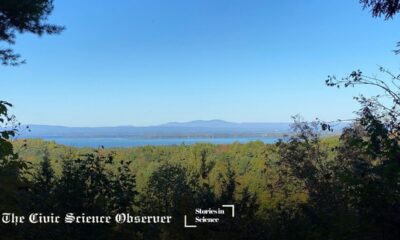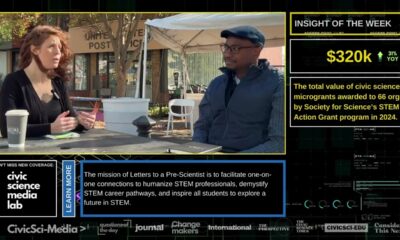Stories in Science Special Series
Science Without Disciplinary Borders: How my Interests in the Humanities Have Strengthened my Psychological Science

– by Tiffany N. Brannon | Assistant Professor | Department of Psychology, University of California, Los Angeles –
[dropcap]A[/dropcap]s children, my sister, Taquesha and I had a love for the humanities and science that extended beyond the boundaries of our school classrooms or even homework assignments. For fun and amusement, we would spend hours conducting science experiments that were described in a set of children’s encyclopedias that my mom had brought as a gift for us. We would similarly pass time reading and writing poems and short stories.
And, although no one in our family had earned a college-degree, we loved being young writers and scientists…it was our play and passion. In middle school, my sister and I both enrolled in a humanities focused magnet program and continued to excel as writers. Yet, our love for science never lagged behind our commitment to writing. In fact, despite accomplishing several firsts in my family including earning a doctorate from Stanford University and many other prestigious accolades my mother’s sharpest memory of me and awards involves a middle school ‘science’ award. Even now, she nostalgically reflects with me about how important it was to my ‘middle school’ self to win that ‘science’ award. And, every time she shares that memory I can only express a knowing and affirmative laugh; yes, even as a student in a humanities program I loved science and I cared deeply about excelling in both the humanities and science.
Throughout childhood play and even middle school years, the academic and disciplinary boundaries between the humanities and science seemed non-existent and invisible. Yet, in high school and college the boundaries became apparent and visible. Commensurate with my love for science, I decided early on that I wanted to major in psychology and to conduct experimental research. And, early on in college, as a first-year and sophomore student, I loved my psychology courses and I became involved in a clinical research lab as a research assistant at Florida International University (FIU). I was also a part of FIU’s Honors College and I deeply loved the interdisciplinary and strongly humanities-influenced curriculum. More specifically, as a student in the Honors College I passionately pursued interests related to dual-identity among African-Americans and how historical and contemporary experiences of prejudice and discrimination have forged a sense of self as an American and a sense of self as an African-American or what W.E.B. DuBois famously termed double consciousness. Thus, being a psychology major who was also in the Honors College allowed me to again follow my love for both science and humanities. Yet, I did not view my interests as related or intertwined; they seemed very much separate to me.
That summer, my undergraduate self who happened upon this insight, through a literature review and stellar guidance from research mentors, fell completely in love with cultural psychology and became committed to merging my interests in the humanities and science to strengthen and broaden the questions that myself as a psychological scientist could ask and dedicate a career to answering.
But thankfully, the separateness that seemed to mark my psychology and humanities interests was challenged when I participated in a Leadership Alliance research program at Stanford University in the summer following my sophomore year. By this time, my love for psychology still flamed bright yet I had decided that I was no longer personally interested in clinical psychology. At this point in my undergraduate career I was open to and very much intrigued by social psychology. During that summer research program, I was a research assistant in Hazel Rose Markus’ lab and I worked closely with her then graduate student MarYam Hamedani (who is now a Senior Research Scientist at Stanford University). As a research assistant, I helped with a literature review on interdependence or a sense of self, motivation and behavior that fundamentally involves awareness of and inclusion of others among American populations (e.g., European-Americans).

Tiffany N. Brannon
Helping with this literature review and engaging in dialogues with MarYam and other research assistants strengthened my knowledge of cultural psychology, and, in so doing, it challenged the boundaries that I had perceived between my interests in psychology and my interests related to dual-identity among African-Americans – which until then – was mostly informed by strongly humanities-themed courses and readings. That is, working on that literature review provided an introduction to cultural psychology as a research area that, while focused on the individual and outcomes tied to the individual (e.g., affect, cognition, behavior, motivation), did not separate the individual or individual-level outcomes from macro and societal-level influences such as history, social institutions and everyday practices. From this perspective, one that views the individual and more macro-level influences as interconnected or as my doctoral advisor, Hazel Rose Markus would say mutually constituted insights gained from the humanities which often connects to and critiques history, social institutions and lived experiences can enrich theorizing within psychology. That summer, my undergraduate self who happened upon this insight, through a literature review and stellar guidance from research mentors, fell completely in love with cultural psychology and became committed to merging my interests in the humanities and science to strengthen and broaden the questions that myself as a psychological scientist could ask and dedicate a career to answering.
Today, I am an assistant professor in the Department of Psychology at the University of California, Los Angeles. My research lab studies socio-cultural identities among historically negatively stereotyped groups (e.g., African-Americans, Latino/a-Americans) and the conditions that allow these identities to be associated with risk and resilience. My lab seeks to understand and advocate for the role that institutions like colleges and universities can play in leveraging these socio-cultural identities to foster positive social, academic, health and even intergroup outcomes. In short, my lab studies diversity science, and with every research question, my lab seeks to address how we leverage our broadly defined diverse perspectives including the diversity of our interdisciplinary (both science and humanities) perspective.
Featured Image is by Ryan McGuire on Pixabay | CC0 Public Domain
The CS Media Lab is a Boston-anchored civic science news collective with local, national and global coverage on TV, digital print, and radio through CivicSciTV, CivicSciTimes, and CivicSciRadio. Programs include Questions of the Day, Changemakers, QuickTake, Consider This Next, Stories in Science, Sai Resident Collective and more.

-
Audio Studio1 month ago
“Reading it opened up a whole new world.” Kim Steele on building her company ‘Documentaries Don’t Work’
-
 Civic Science Observer1 week ago
Civic Science Observer1 week ago‘Science policy’ Google searches spiked in 2025. What does that mean?
-
Civic Science Observer1 month ago
Our developing civic science photojournalism experiment: Photos from 2025
-
Civic Science Observer1 month ago
Together again: Day 1 of the 2025 ASTC conference in black and white
Contact
Menu
Designed with WordPress
























